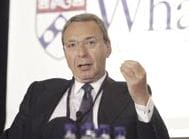Linneman was moderating an impressive real estate panel that included Bill Mack, W’61, senior principal of Apollo Real Estate Advisors LP and president of the corporate general partners of the Apollo Real Estate Funds; Sam Zell, chairman of Equity Group Investments; and Mort Zuckerman, WG’61, chairman of Boston Properties, editor-in-chief of U.S. News & World Report, and publisher of the New York Daily News.
The Economic Summit represented the U.S. kick-off to Wharton’s 125th anniversary celebration. The day-long event included panel discussions on the futures of real estate, corporate governance, and energy investing; presentations from renowned Wharton finance professor Jeremy Siegel and alumnus Michael Milken, WG’70; and a concluding speech by shareholder activist Carl Icahn.
The summit’s speakers included Jan Eliasson, president of the United Nations General Assembly, who delivered the opening keynote speech; and host Maria Bartiromo, from “Wall Street Journal Report with Maria Bartiromo” and CNBC’s “Closing Bell.” Media covering the event included CNBC, Bloomberg TV, BusinessWeek, The Economist, Forbes, Reuters, and the Wall Street Journal.
In the first panel discussion, Martin Lipton, W’52, founding partner of the corporate law firm Wachtell, Lipton, Rosen & Katz, made the case against hedge funds, who he says are “pressuring companies to act for short-term performance.” Lipton spoke on a panel titled, “After the Corporate Governance Revolution: The Imperial Board of Directors” with fellow alumnus Arthur Collins, WG’73, chairman and CEO of Medtronic.
The day’s last three panelists addressed renewable energy, arguing that only high energy prices will drive enough demand to fund the development of renewable fuels. “We’ll be a hydrocarbon-based economy for a long time,” concluded Aubrey McClendon, chairman and CEO of Chesapeake Energy, who sat on the panel with William Macaulay, WG’68, chairman and CEO of First Reserve, and David Crane, president and CEO of NRG Energy.
In his much-anticipated session, Jeremy Siegel assessed “the most critical long-term economic issue facing the developed world” — the economic effects of aging populations.
According to Siegel’s predictions, the developed world will have an increasingly smaller slice of the world’s GDP, while the comparatively young populations of India and China will contribute a projected 77% share of the world’s GDP by 2050.
 Photos by Tommy Leonardi
Photos by Tommy Leonardi


























